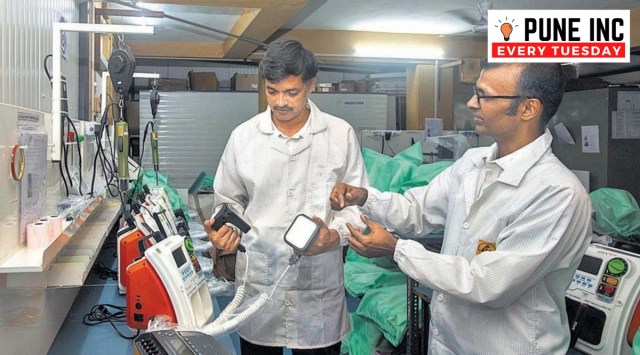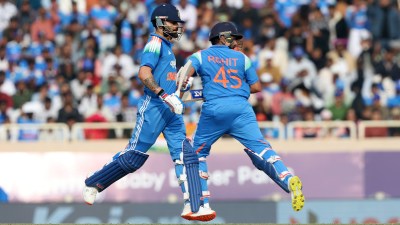They went to the same school at Pimpri and then studied engineering at D Y Patil College. After their separate stints in the United States, Ashish Gawade and Aniruddha Atre decided to return to their hometown in Pune and work together to provide innovative solutions in the healthcare sector.
‘World-class but affordable’ – that’s what Gawade and Atre, the founders of Jeevtronics Pvt Ltd, had in mind when they entered the medical devices market in 2014. Five years later they launched their dual-powered and only ambulance-certified defibrillator in India and with a current capacity to produce at least 300 devices per month and healthy gross margins the Pune-based startup has now had enquiries for exporting their product.

This medical device helps to restore the normal heart rhythm by applying a high voltage shock across a cardiac arrest patient’s heart and essentially helps deal with sudden cardiac arrest and situations of arrhythmias. “However, only one in 50 hospital beds in India has a defibrillator. This owes to a lack of reliable electricity supply, affordability, poor quality refurbished devices, and the high cost of battery replacement required for defibrillators,” Atre told The Indian Express.
Both Atre and Gawade did a thorough study before launching the medical device. “According to reports, India accounts for 11 per cent of global deaths in road accidents. Since accident trauma patients are very likely to go into a cardiac arrest, the presence of defibrillators in trauma ambulances is crucial. Yet, only advanced life support ambulances (about 25 per cent of total ambulances) have defibrillators,” said Atre.
He pointed out that in this context, Jeevtronics developed the SanMitra 1000 HCT and the SanMitra 1000 HCT EMS Biphasic Defibrillator, a first-of-its-kind, low-maintenance, cost-effective, lifesaving, hand-cranked defibrillator.
“The device can be charged from the AC mains within 6-7 seconds, which is twice as fast as multinational players’ brands and is priced at less than 25 per cent of what they cost. The long lifespan, affordable costs, and ability to run without electricity make this device critical in allowing healthcare workers to provide quality emergency care to avoid preventable deaths, particularly in low-resource settings. Eighty per cent of these devices are being supplied to tier II and III towns reaching the most vulnerable,” the Jeevtronics founders said.
In January 2021, the team donated a defibrillator to the Covid-19 ward of AIIMS Nagpur, and it has been used extensively and proved to be useful for resuscitating patients during the pandemic. “We have deployed 330 devices so far across small nursing homes and even large hospitals for instance in Pune it is at Deenanath Mangeshkar hospital or then to Dr Prakash Amte’s Lok Biradari Project hospital at Gadchiroli district,” said Atre.
Story continues below this ad
Even beyond the pandemic, the device continues to save lives. At a government hospital in Raigad, Maharashtra, the SanMitra is used to provide emergency care to several sudden cardiac arrest patients, young and old, brought in critical condition – oftentimes due to serious road accidents on highways. “In a government hospital setting in rural areas, where there’s sometimes no electricity or load shedding, the defibrillator is very useful. During an emergency at the hospital, the SanMitra Defibrillator is easy to transport, and it’s also easy to train the staff and interns on how to use it,” added Gawade.
SAMRIDH, supported by USAID and implemented by IPE Global, has enabled Jeevtronics to increase accessibility to this life-saving device across resource-constrained hospitals in semi-urban and rural regions of India. Through financial and business advisory support, SAMRIDH is providing Jeevtronics with the opportunity to increase its market presence and design a commercial strategy for building a steady pipeline of orders. This is further aiding them to secure affordable working capital loans to service the new order flow and build a business model for long-term sustainability and expansion to low-resourced hospitals. Bolstered by the support in distribution and sales, Jeevtronics estimates impacting the lives of 1.9 million people from low-income communities.
When contacted, Himanshu Sikka, Project Director, SAMRIDH Healthcare Blended Financing Facility, said, “The uniqueness of this medical device is that it runs without electricity and provides quality emergency care in low-resource settings. It also strengthens the ambulance infrastructure in the country to extend immediate trauma care for accident victims.” “We are collaboratively working towards increasing the entity’s market presence and designing a viable commercial strategy,” added Sikka.
Gawade further acknowledged the initial support from Venture Centre, BIRAC-DBT, DST, and several others.









